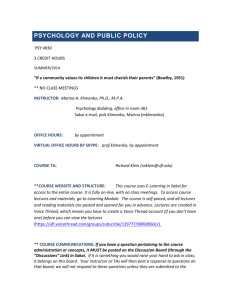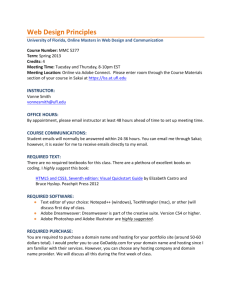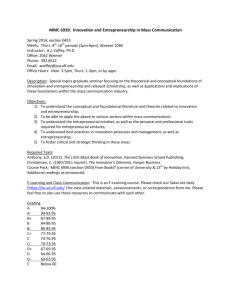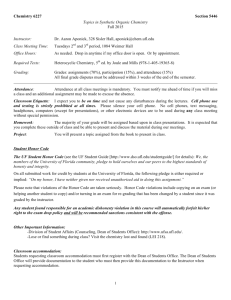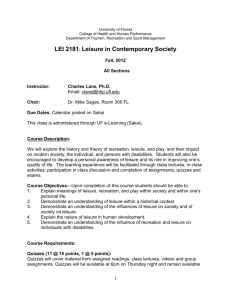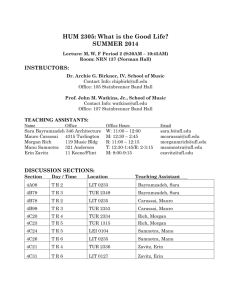Recent Lab Syllabus
advertisement
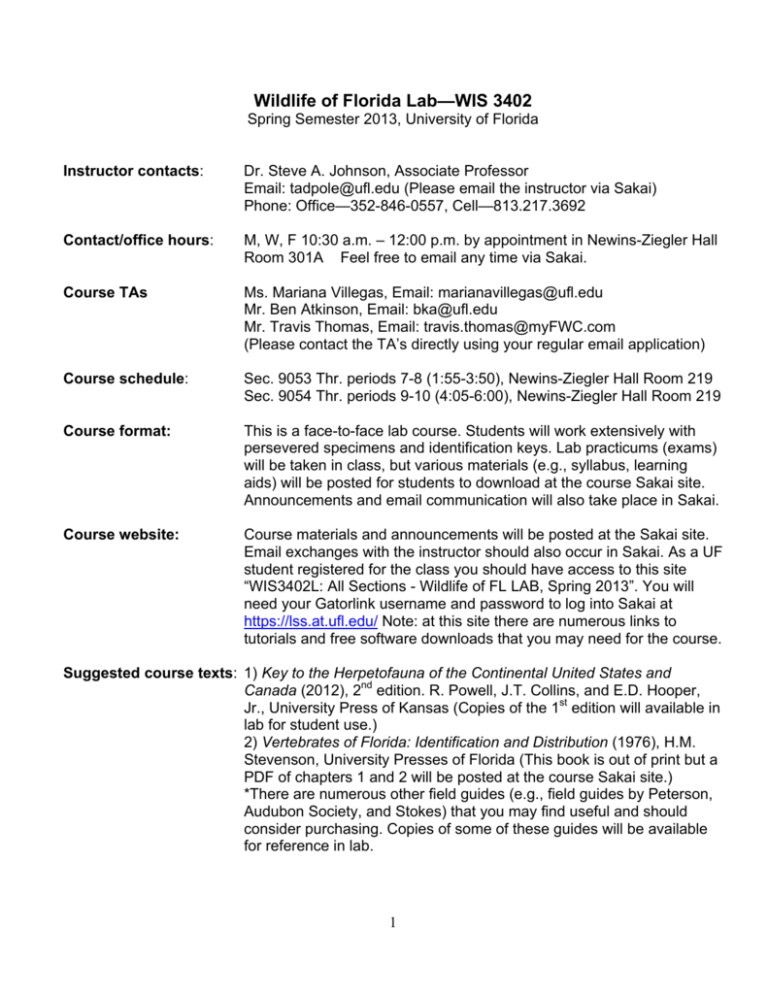
Wildlife of Florida Lab—WIS 3402 Spring Semester 2013, University of Florida Instructor contacts: Dr. Steve A. Johnson, Associate Professor Email: tadpole@ufl.edu (Please email the instructor via Sakai) Phone: Office—352-846-0557, Cell—813.217.3692 Contact/office hours: M, W, F 10:30 a.m. – 12:00 p.m. by appointment in Newins-Ziegler Hall Room 301A Feel free to email any time via Sakai. Course TAs Ms. Mariana Villegas, Email: marianavillegas@ufl.edu Mr. Ben Atkinson, Email: bka@ufl.edu Mr. Travis Thomas, Email: travis.thomas@myFWC.com (Please contact the TA’s directly using your regular email application) Course schedule: Sec. 9053 Thr. periods 7-8 (1:55-3:50), Newins-Ziegler Hall Room 219 Sec. 9054 Thr. periods 9-10 (4:05-6:00), Newins-Ziegler Hall Room 219 Course format: This is a face-to-face lab course. Students will work extensively with persevered specimens and identification keys. Lab practicums (exams) will be taken in class, but various materials (e.g., syllabus, learning aids) will be posted for students to download at the course Sakai site. Announcements and email communication will also take place in Sakai. Course website: Course materials and announcements will be posted at the Sakai site. Email exchanges with the instructor should also occur in Sakai. As a UF student registered for the class you should have access to this site “WIS3402L: All Sections - Wildlife of FL LAB, Spring 2013”. You will need your Gatorlink username and password to log into Sakai at https://lss.at.ufl.edu/ Note: at this site there are numerous links to tutorials and free software downloads that you may need for the course. Suggested course texts: 1) Key to the Herpetofauna of the Continental United States and Canada (2012), 2nd edition. R. Powell, J.T. Collins, and E.D. Hooper, Jr., University Press of Kansas (Copies of the 1st edition will available in lab for student use.) 2) Vertebrates of Florida: Identification and Distribution (1976), H.M. Stevenson, University Presses of Florida (This book is out of print but a PDF of chapters 1 and 2 will be posted at the course Sakai site.) *There are numerous other field guides (e.g., field guides by Peterson, Audubon Society, and Stokes) that you may find useful and should consider purchasing. Copies of some of these guides will be available for reference in lab. 1 Do not bring any food or drinks into the lab (water is okay) to avoid attracting insect pests that could damage the study skins! Course objective, description, and format: This lab course is designed to familiarize students with the taxonomy and identification of many of Florida’s native (some introduced species too) birds, mammals, amphibians, and reptiles. The major objectives of the course are for students to be able to identify to species, many of the terrestrial vertebrates (native and introduced) of Florida based on morphological characteristics, behaviors, and vocalizations and use dichotomous keys to identify unknown species. This is a very “hands-on” course, and students will work with many specimens (skins, skulls, pickled specimens) in order to learn characters that allow identification to species. Students will learn to identify species through detailed study of preserved specimens and use of dichotomous keys and field guides. Information delivery will consist of study of preserved museum specimens, use of dichotomous keys and guides, brief lectures, class discussion, and field outings. This is largely a self-paced class and attendance will not be taken. However, given the limited amount of scheduled lab time and the large number of species, students are strongly encouraged to make efficient use of lab time. Students who come to lab late, leave early, and make poor use of their time in lab will not do well in the course. There will be numerous opportunities for field outings to observe animals in their native habitats, which will enhance species identification skills. Exams: There will be 4 exams given during the course, and these exams will be in lab practicum format. Practicums will be administered in lab and will consist of numerous stations at which students must answer various questions. Practicums will be timed and students will only have 2-3 minutes per station to answer questions. Questions will focus largely on species identification, and taxonomy, but will include other questions too. Lab practicum 1 covers mammals; practicum 2 covers birds; practicum 3 covers amphibians; and practicum 4 covers reptiles—lab practicums are not cumulative. With the exception of the practicum 4, lab practicums will be administered in class during regularly scheduled course periods (see lab schedule below). Due to the nature of the lab practicum format, missed lab practicums cannot be made up! A missed lab practicum grade can only be replaced by a grade from a cumulative lab exam administered by the instructor at the end of the course. In order to be able to take such a cumulative exam, a student must provide a legitimate, documented excuse as to why the practicum was missed within 5 days of the missed practicum. Points and Final Grade: Points: Lab Practicums (4 @ 100 points each): 400 points Grades: A (90%>), B (80 - 89.9%), C (70 – 79.9%), D (60 – 69.9%), E (<60%) Final grades are based on percentages of total points possible. Scores on practicums are not curved. No plus or minus grades are given in this course. 2 Do not bring any food or drinks into the lab (water is okay) to avoid attracting insect pests that could damage the study skins! Lab Schedule for Wildlife of Florida—Spring 2013 January 10: Lab Introduction, Dichotomous Keys January 17: Mammals January 24: Mammals **January 30 (Wednesday): Extra mammal study period—6-9 p.m. January 31: Lab Practicum—Mammals February 7: Birds February 14: Birds February 21: Birds **February 27 (Wednesday): Extra bird study period—6-9 p.m. February 28: Lab Practicum—Birds March 7: NO CLASS—UF Spring Break March 14: Amphibians March 21: Amphibians **March 27 (Wednesday): Extra amphibian study period—6-9 p.m. March 28: Lab Practicum—Amphibians April 4: Reptiles April 11: Reptiles April 18: Reptiles **April 24 (Wednesday): Extra reptile study period—6-9 p.m. April 25: Lab Practicum—Reptiles (Note: this is a UF reading day; please speak with the course instructor immediately if this will pose a hardship for you) This schedule is tentative and may change to meet the needs of the instructor or students. Do not bring any food or drinks into the lab (water is okay) to avoid attracting insect pests that could damage the study skins! 3 Field Outings: To provide opportunities to observe wildlife in their native habitats there will be numerous field outings in this class. Field outings are optional, but students are strongly encouraged to attend at least one outing—space is limited on most trips. Details will be discussed in lab. Lab Field Outing Schedule 1) January 25, Friday: Full-day trip to Crystal River to swim with manatees and visit Homosassa Springs Wildlife State Park to see native wildlife 2) February 2, Saturday: Full-day trip to Merritt Island NWR to see a diversity birds 3) February 23, Saturday: Half-day trip to Paynes Prairie to see alligators & birds 4) March 15-17, Friday—Sunday: Weekend trip to Carrabelle to capture Diamondback Terrapins at Lanark Reef 5) April 6, Saturday: Full-day trip to snorkel for turtles in Rainbow Run w/ Eckerd College’s Dr. Peter Meylan and his students 6) April 19-21, Friday—Sunday: Weekend trip to Torreya State Park to look for reptiles and amphibians Getting help with technology: For IT help regarding issues with the course involving the Sakai site, first check the student FAQ https://lss.at.ufl.edu/help/Student_Faq and tutorial links https://lss.at.ufl.edu/sakaitraining/student_index.shtml in Sakai and then try the e-Learning Support Services link https://lss.at.ufl.edu/services/els/stu_intro.shtml or post a question to the Cyber Cafe discussion topic at the course website—some of your classmates may be able to offer you help. If you still need assistance after exploring the above options, contact the UF Computing Help Desk (352-3924357, helpdesk@ufl.edu). Frequently Asked Questions 1. How do I access the online learning management system used for this course? Portions of this course are delivered in the UF Sakai e-learning course platform. You will need a Gatorlink account to log on to E-Learning in Sakai. To log on to E-Learning in Sakai, go to http://lss.at.ufl.edu/ and click on the orange ‘e-Learning Login’ button in the left column; you will be prompted to enter your Gatorlink username and password. Once you have entered your Gatorlink username and password your Sakai page will load and all of the Sakai courses you are registered for will be available to you. If you are in multiple courses, all of them may not show up in the grey bar at the top of the page. If this is the case, choose the dropdown menu associated with the ‘My 4 Active Sites’ link to see the rest of your courses and choose the correct one. This course will appear as “WIS3402L: All Sections - Wildlife of FL LAB, Spring 2013”. 2. Where do I acquire the required text and instructional materials for this course? There is no required text for this course. Suggested field guides are listed above and some guides will be available for use in lab. Additional materials will be uploaded as PDFs in Sakai. 3. Do I have to have Internet access at home? No, but you are strongly encouraged to have reliable Internet access at home. The University also has many student computer labs available to students who wish to use them. 4. What computer programs will I need to use in this course? Adobe Acrobat reader is free software required to view and print course materials that are available in Sakai as PDF files. To download the free reader, go to: http://get.adobe.com/reader/ E-Learning in Sakai is the centrally-supported course management system at UF. For a tutorial regarding E-Learning Sakai functionality, go to https://lss.at.ufl.edu/sakaitraining/student_index.shtml A Web Browser is essential and not all web browsers are compatible with Sakai. It is recommended that you use Firefox (Mozilla) to access Sakai, especially for taking quizzes and exams. The Firefox web browser can be downloaded for free at http://www.mozilla.org/ 4. Where do I get help with computer problems and other technical help? If you have a question or problem using technology required for this course, including using Sakai, here are the steps you should take. 1. Consult the student tutorial page in Sakai https://lss.at.ufl.edu/sakaitraining/student_index.shtml 2. Consult the student FAQ page in Sakai https://lss.at.ufl.edu/help/Student_Faq 3. Post a question to the Cyber Café discussion topic at the course Sakai page 4. Call the UF Help Desk (call the Help Desk for urgent questions) 5. Email the course instructor 6. Call the course instructor The UF Computing Help Desk is available by phone or email at: (352) 392-HELP (4357) and helpdesk@ufl.edu . The hours of operation are: Monday-Thursday: 7:30am-10:00pm, Friday: 7:30am-5:00pm and Weekends: 12:00pm-6:00pm. Before calling the UF help desk try to figure out the issue yourself by visiting the Sakai Student FAQ https://lss.at.ufl.edu/help/Student_Faq and Tutorial Pages https://lss.at.ufl.edu/sakai-training/student_index.shtml. See the ‘Getting help with technology’ section on page 4 of this syllabus for more information. 5 5. What is the University policy on software use? All faculty, staff and students of the university are required and expected to obey the laws and legal agreements governing software use. Failure to do so can lead to monetary damages and/or criminal penalties for the individual violator. Because such violations are also against university policies and rules, disciplinary action will be taken as appropriate. 6. What if I need special accommodations to take the course? The UF Disability Resource Center coordinates the needed accommodations of students with disabilities. This includes registering disabilities, recommending academic accommodations within the classroom, accessing special adaptive computer equipment, providing interpretation services and mediating faculty-student disability related issues. Contact the Disability Resource Center by phone: (325) 392-8565, the UF Gainesville campus, Room 0001 Reid Hall, or online at: www.dso.ufl.edu/drc/ 7. How long will I have to wait for a response from the instructor to my e-mail? On weekdays, your instructor should respond to emails within 24 hours, but this may not always happen due to meetings and research obligations. Emails sent on weekends will not be answered until Monday. 6 University of Florida Policy Statements Academic Honesty In 1995 the UF student body enacted a new honor code and voluntarily committed itself to the highest standards of honesty and integrity. When students enroll at the university, they commit themselves to the standard drafted and enacted by students. In adopting this honor code, the students of the University of Florida recognize that academic honesty and integrity are fundamental values of the university community. Students who enroll at the university commit to holding themselves and their peers to the high standard of honor required by the honor code. Any individual who becomes aware of a violation of the honor code is bound by honor to take corrective action. The quality of a University of Florida education is dependent upon community acceptance and enforcement of the honor code. The Honor Code: We, the members of the University of Florida community, pledge to hold ourselves and our peers to the highest standards of honesty and integrity. On all work submitted for credit by students at the university, the following pledge is either required or implied: “On my honor, I have neither given nor received unauthorized aid in doing this assignment.” The university requires all members of its community to be honest in all endeavors. A fundamental principle is that the whole process of learning and pursuit of knowledge is diminished by cheating, plagiarism and other acts of academic dishonesty. In addition, every dishonest act in the academic environment affects other students adversely, from the skewing of the grading curve to giving unfair advantage for honors or for professional or graduate school admission. Therefore, the university will take severe action against dishonest students. Similarly, measures will be taken against faculty, staff and administrators who practice dishonest or demeaning behavior. Students should report any condition that facilitates dishonesty to the instructor, department chair, college dean or Student Honor Court. (Source: 2007-2008 Undergraduate Catalog) It is assumed all work will be completed independently unless the assignment is defined as a group project, in writing by the instructor. This policy will be vigorously upheld at all times in this course. Software Use All faculty, staff and students of the university are required and expected to obey the laws and legal agreements governing software use. Failure to do so can lead to monetary damages and/or criminal penalties for the individual violator. Because such violations are also against university policies and rules, disciplinary action will be taken as appropriate. Campus Helping Resources Students experiencing crises or personal problems that interfere with their general wellbeing are encouraged to utilize the university’s counseling resources. Both the Counseling Center and Student Mental Health Services provide confidential counseling services at no cost for currently enrolled students. Resources are available on campus for students having personal problems or lacking clear career or academic goals, which interfere with their academic performance. The Counseling Center is located at 301 Peabody Hall (next to Criser Hall). Student Mental Health Services is located on the second floor of the Student Health Care Center in the Infirmary. • University Counseling Center, 301 Peabody Hall, 392-1575,www.counsel.ufl.edu • Career Resource Center, CR-100 JWRU, 392-1602, www.crc.ufl.edu/ • Student Mental Health Services, Rm. 245 Student Health Care Center, 392-1171, www.shcc.ufl.edu/smhs/ - Alcohol and Substance Abuse Program (ASAP) - Center for Sexual Assault / Abuse Recovery & Education (CARE) - Eating Disorders Program - Employee Assistance Program - Suicide Prevention Program Students with Disabilities The Disability Resource Center coordinates the needed accommodations of students with disabilities. This includes registering disabilities, recommending academic accommodations within the classroom, accessing special adaptive computer equipment, providing interpretation services and mediating facultystudent disability related issues. 0001 Reid Hall, 392-8565, www.dso.ufl.edu/drc/ 7

